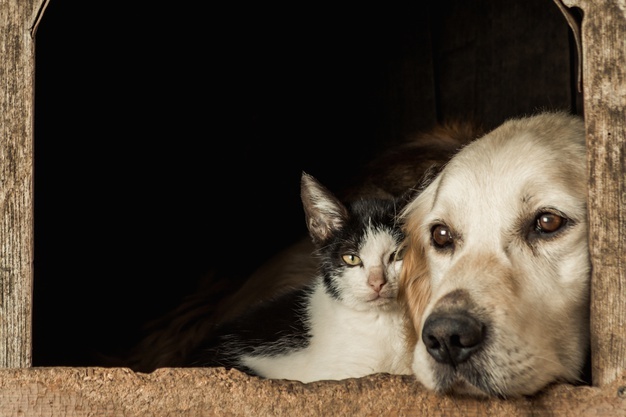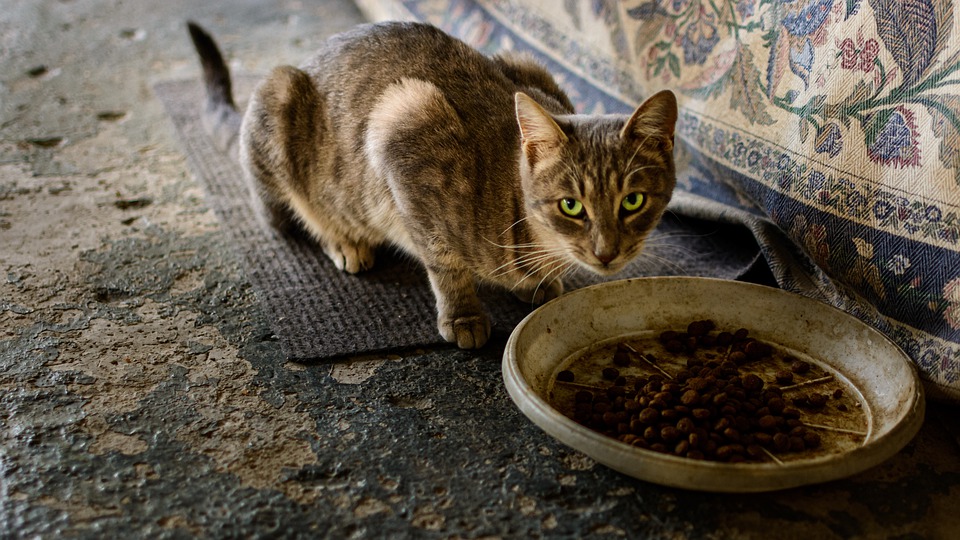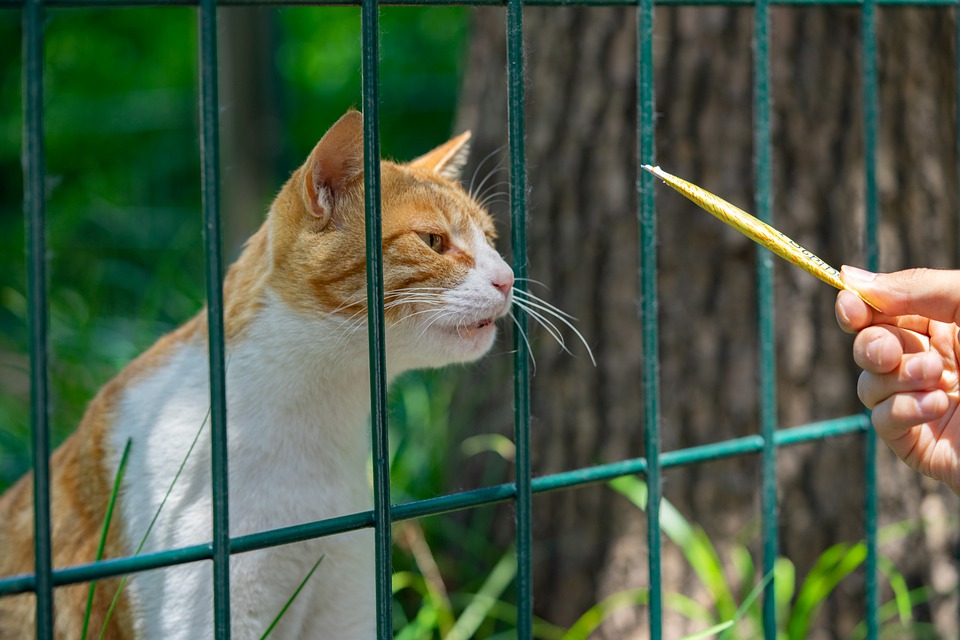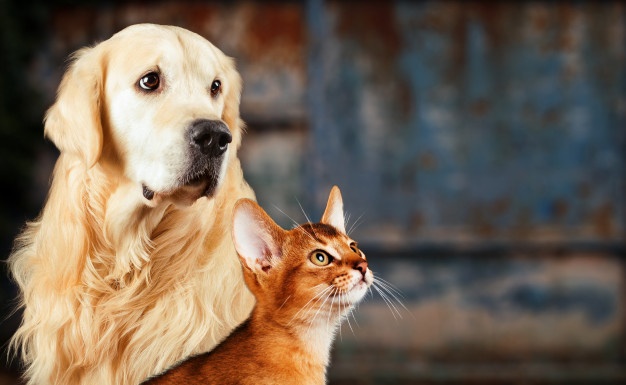Treats and snacks for cats are a way to pamper your pussy and also help you to improve or establish a good relationship with him. On the other hand, they are the perfect treats during the training or education of any pet. Many people who own both cats and dogs many times ask if their cats eat dogs’ treats or not. So, here let’s find out that can cats eat dog treats?
Can Cats Eat Dog Treats?
If your home is home to both dogs and cats, you might be wondering if it’s harmful to your pets to eat from each other’s food. The answer is clear: cats and dogs each need their own specialized food. However, there is nothing to panic about if your cat nibbles once or twice in your dog’s bowl or vice versa. But keep in mind that 90% of illnesses in dogs and cats are caused by improper nutrition.
What Are The Difference Between Cat Treats and Dog Treats?
The cat, on the other hand, is always carnivorous. It has a high need for animal proteins and fats as well as taurine amino acids. The nutritional needs of the cat are therefore very different from those of the dog.
Here are some of the key differences between dog and cat foods that you might not notice just by reading the ingredients on the packaging:
Vitamin:
They include meat, fish, offal, vitamins, and minerals. It is advisable to give such treats as recommended by your veterinarian. For example, cats that eat good quality commercial food get everything they need from food, and an excess of vitamins is no less harmful than a deficiency.
Preventive:
They are given to cats of age for the prevention of diseases: to remove excess hair, to avoid gastritis, constipation, and so on. They are also offered to sick animals: for example, during the treatment of diseases of the gums and teeth.
Beta Carotene:
This nutrient is added to dog food so that vitamin A is obtained from beta-carotene in the pet’s body. Feline metabolism is not capable of such a transformation, therefore, cat food is enriched with ready-made vitamin A.
Arachidonic Acid:
Arachidonic acid is one of the essential polyunsaturated fatty acids. The cat’s body cannot synthesize it, so arachidonic acid is added to food or given as a dietary supplement. Dogs do not need this as they are their digestive system is able to produce arachidonic acid from animal fat obtained from food.
Proteins and Fats:
Cats need higher levels of protein and fat in their feed to get the energy they need. Cats are not able to get it from carbohydrates.
Caloric Content:
Cat foods are generally higher in calories than dog foods.
Taurine Content:
Taurine – Cats need to get it from their diet, as they cannot produce this nutrient they need. Dogs are capable of producing taurine on their own. Lack of taurine in cats can lead to heart problems.
The Ratio of Vegetables and Meat:
Dog food contains more vegetables than cat food. Although dogs are carnivores, they can survive by eating vegetables or vegan food if there is no other option. This is due to the fact that dogs, unlike cats, can get energy from carbohydrates. Cats are obligate predators (as they call those who feed exclusively on other animals), so they need meat (or food with a high content of animal proteins) to survive.
Content of Zinc and vitamin E:
These nutrients are less in the cat food, so a dog on a “cat” diet will suffer from a lack of them.

Image: https://image.freepik.com/free-photo/closeup-shot-snouts-cute-dog-cat-sitting-cheek-cheek_181624-21012.jpg
What Happens When Cats Eat Dog Treat?
Here is an inquiry that individuals who own both a canine and a feline ask themselves, every creature having the option to be enticed to impart its dinner to its sidekick, or to participate in through and through a demonstration of appropriating when its beau has him covered. turned. For a feline, eating canine food sporadically won’t influence his wellbeing.
The overall wellbeing of the feline is generally identified with its eating routine. Assuming the creature is prone to eat canine food, it won’t remain to look great for extremely long. It can even present long-haul medical issues. Without a doubt, for his purposes, dangers of destructiveness truly exist, which can prompt:
- Absorption issues:
- Hindrance of the pancreas like pancreatitis: an intense issue brought about by abundance fat in the eating routine,
A dominance of corpulence is brought about by the abundance of protein, An over-burden of emunctory organs, for example, the kidneys and the liver, which after some time can prompt:
- Kidney failure,
- Liver failure.
The multitude of dangers to which the feline is presented is because of the way that the nourishment for the feline is too greasy and too wealthy in protein. They are intended to meet the fundamental requirements of the canines yet unquestionably not those of the felines. In case he eats from his little pup amigo’s bowl each day, he can likewise experience the ill effects of genuine supplement lacks. Minor components, minerals, nutrients are to be dosed by individual necessities.

Image: https://cdn.pixabay.com/photo/2020/11/22/14/18/cat-5766723_960_720.jpg
What Are The Best Treats For Cats?
we are interested in the health of your kitten, we are going to give you ideas about those that are not harmful to him. First of all, it is very important not to abuse this type of food, as they only provide calories and very few important nutrients.
It is recommended that no more than 5-10% of the diet consists of sweets; the rest of the calories must be provided by a balanced diet of good quality formulated for the age and health of each cat. If you are going to use snacks for education, you should break them into small pieces, so you do not give him much and the cat does not lose interest when he is no longer hungry.
Cat Biscuits:
Cat treats or biscuits can be used to reward your furry friend. We all like to give our pets a tasty treat to show them how much we love them. You will only have to reduce the amount of the main food and choose those treats that are nutritionally balanced so that they do not harm your diet.
Although there are treats for kittens, they are not recommended for them. You can find more information on how to feed your kitten here Feeding a kitten. Make sure that, along with main meals and treats, your cat has access to fresh, clean water throughout the day.
You can use as a reward some of the dry feed grains that you offer as the main food, especially if your cat follows a special diet for health or weight control reasons, as treats will not be allowed. Consult your doubts with the vet.
Meat:
These provide an interesting percentage of protein to the diet and are also delicious for cats. They usually consist of chicken, liver, or beef meat that is stuffed and bagged to maintain freshness. There are also pieces of soft and moist meat that are sold in cans or pouches with zip closure.
Another great snack in this category is stuffed anchovies, a perfect delicacy for your pet. All of these treats are irresistible to kitties, who will do anything to get one.
Apple:
Cats can enjoy this fruit without remorse, you can suggest giving it small pieces, with or without skin, that really need to be washed well.
Peach:
A moderately consumed peach is a fruit that is highly recommended for cats and they tend to love it very much as well.
Melon:
Melon is a great fruit for our friends, and they love and keep them hydrated as well.
Strawberries:
A fruit with a high vitamin C content, according to experts, strawberries are not toxic to cats, dogs or horses, but with caution.

Image: https://cdn.pixabay.com/photo/2020/05/23/09/03/cat-5208727_960_720.jpg
Treats to Avoid:
In the kitten treats department, what to choose? Especially not these a priori tempting ideas. Certain food products are indeed dangerous for your baby cat and any adult cat, sometimes likely to cause chronic diseases such as diabetes.
Chocolate:
It’s no secret that chocolate so loved by humans is a real poison for pets. Theobromine, a molecule found in chocolate, is highly harmful to cats.
Sugar and salt:
Wouldn’t you like to give your furball a lump of sugar or a pinch of salt? Yet these harmful ingredients are hidden in many kitten kibble and treats.
Avocado:
This is a fruit that is often confused with a vegetable because it does not taste as good as the fruit we know. But that’s exactly what it is. In addition, it is very dangerous for cats as it contains persin, which is toxic to felines and, as if that were not enough, can damage the pancreas.
Citrus fruits:
These can cause stomach pain and discomfort. Fortunately, they are not attracted by smell or taste (they do not perceive sweetness).
Grapes and Raisins:
Taking it causes kidney problems.
Fatty Meats:
Meats like lamb, pork, and others increase cholesterol levels and lead to obesity. Raw, untreated meat – may contain helminth eggs, Trichonella larvae (pork), pathogenic bacteria and microorganisms.
Fish:
In addition to the possible presence of parasites and the risk of damage to the esophagus by small bones, phosphorus, which is contained in large quantities in fish, is a danger. By settling in the kidneys, salts of this element can lead to the development of urolithiasis.
It is allowed to include in the diet of lean sea fish fillets no more than 1-3 times a week.
Dairy Products:
The body of an adult cat does not metabolize lactose, which can lead to an upset stomach. It is useful to add low-fat dairy products to the cat’s diet: fermented baked milk, kefir, cottage cheese. Sweet yogurts should not be given because of the sugar content.
Industrial Feed:
The main recommendations of veterinarians boil down to the fact that it is necessary to carefully approach the choice of food for your pet. Give preference to professional premium food containing a balanced set of all essential nutrients. The choice of food should be based on the age and health of the animal.
The main signs of a properly selected diet are health, activity, good mood, and appearance of the pet. At the same time, do not forget about periodic examinations by a veterinarian – far from all diseases caused by improper nutrition can be detected in a timely manner at home.
Foods with Garlic:
In small doses, they are not a problem (many excellent quality foods with fresh ingredients and no cereals) usually contain very small amounts of garlic, but should not be overused as it contains thiosulfate, which is unhealthy. a substance that can cause anemia.
Foods with Onions:
Like garlic, it contains thiosulfate, but in large quantities, it is, therefore, more dangerous.
Tomatoes:
Like tubers, they contain solanine. It should not be given to cats and it is not recommended to plant tomatoes, as they can peel themselves off with leaves, which are also harmful to them.
Can Cats Eat Sweet?
Presently you comprehend that desserts and felines are contradictory. Felines don’t recognize the sweet taste, so you don’t have to legitimize your own flightiness by giving your darling kitty something hurtful to her wellbeing and life.
Obesity is a dangerous disease not only for humans but also for animals. If you notice that your pet has gained extra pounds, review his diet. Perhaps there are excess foods in his diet. If you do not take action in time, then obesity can lead to problems with the heart and blood vessels, liver.
Conclusion:
Treats for your cat should be given sparingly and intelligently. Do not get used to going off the beaten track, consisting of its traditional food. Otherwise, he will turn away in favor of little extras. These should be reserved for the reward. In the event that your cat does a remarkable deed. In addition, choose treats specially made for felines, and forget about human food, table scraps. Your cat could be suffering from serious health problems.
Do not forget, however, the recommendation to seek the help of your veterinarian in choosing treats for your cat. Follow this advice whenever you decide to switch up your treats. This will give you the confidence that what you are giving your cat is right for her.

Image: https://www.simplilearn.com/ice9/free_resources_article_thumb/What_Should_Go_On_Website_FAQ_Page.jpg
FAQ:
Q. Why make your cat eat treats?
A. Cat treats are foods intended to please your cat. They can also be used for training and education. It boils down to giving it to him every time he does a good deed, in order to instill good habits in him.
Cat treats also help improve the health of cats. They contain, in fact, many vitamins that strengthen their immune system and fight against the formation of hairballs in their digestive tract. They also participate in their good oral hygiene by particularly fighting against the build-up of tartar.
Q. How often you should give treats to your pet cat?
A. The treat is not a necessary diet, it is a kind of reward for pampering your feline. That is why we have to be reasonable in terms of frequency and quantity.
Q. Can cats eat peanut butter?
A. Peanut butter isn’t poisonous to felines. Your feline can appreciate it as an easygoing treat as long as the piece size is little. Notwithstanding, assuming peanut butter is burned-through for quite a while or in overabundance, the feline can become ill. Peanut butter is plant food, so a meat-eating feline can not process it appropriately. Besides, it contains void calories, loads of salt, additives, and sugar. Because of its surface, it can likewise be a stifling risk.
Q. Do cats love peanut butter?
A. Most cats don’t like peanut butter. If you offer a spoon to a curious cat, she will most likely sniff it and refuse. This is because cats know they are carnivores, so they are not attracted to plants or plant foods.
Q. Can cats eat peanut butter as a treat?
A. If your cat is interested in eating peanut butter, you can offer it as a treat. If it is given in small amounts, sparingly, and does not spoil the cat’s appetite, then it is safe. Just make sure it doesn’t become a daily or weekly treat. If the cat asks for supplements, do not give her a large serving or a second serving.
Q. Can cats eat jelly?
A. Peanut butter is high in calories. Calories in and of themselves are not bad. However, because peanut butter lacks the nutrients it needs, your cat will gorge itself on essentially useless food.
Q. Is peanut butter bad for cats?
A. Peanut butter is not harmful to cats, but it is not good for them either. The extra sugar, calories, and lack of nutrients make it an acceptable treat, but not a healthy food for cats. Even worse, there are times when peanut butter is actively harming.
